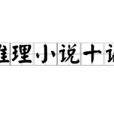是天主教蒙席,資深編輯暨作家隆納德‧諾克斯(Ronald A. Knox)於1928年定下的推理小說原則。十誡內容主要環繞故事脈胳的鋪排、角色類型和性格。其中不乏有些錯誤的認知,但在古典推理的黃金時期曾被奉為圭臬。不過隨著推理小說寫作方式與風格的演變,有作者會刻意違背十誡的內容來寫,而目前推理小說作家在寫作時都不會刻意遵守十誡的內容。
基本介紹
- 中文名:推理小說十誡
- 外文名:Ten Commandments of Detection
- 作者:隆納德‧諾克斯
- 時間:1928
簡介,諾克斯十誡,
簡介
資深編輯暨作家隆納德‧諾克斯(Ronald A. Knox)。
他在1928年立下了著名的「推理十誡」(Ten Commandments of Detection),因而對當代及後進作家產生了警惕的作用。
諾克斯十誡
1 The criminal must be someone mentioned in the early part of the story, but must not be anyone whose thoughts the reader has been allowed to follow.
罪犯必須是故事開始時出現過的人,但不得是讀者可以追蹤其思想的人。
2 All supernatural or preternatural agencies are ruled out as a matter of course.
偵探不能用超自然的或怪異的偵探方法
3 Not more than one secret room or passage is allowable.
犯罪現場不能有超過一個秘密房間或通道
4 No hitherto undiscovered poisons may be used, nor any appliance which will need a long scientific explanation at the end.
作案時候,不能使用尚未發明的毒藥,或需要進行深奧的科學解釋的裝置
5 No Chinaman must figure in the story.
不準有中國人出現在故事裡(備註1)
6 No accident must ever help the detective, nor must he ever have an unaccountable intuition which proves to be right.
偵探不得用偶然事件或不負責任的直覺來偵破案件
7 The detective must not himself commit the crime.
偵探不得成為罪犯
8 The detective must not light on any clues which are not instantly produced for the inspection of the reader.
偵探不得根據小說中未向讀者提示過的線索破案
9 The stupid friend of the detective, the Watson, must not conceal any thoughts which pass through his mind; his intelligence must be slightly, but very slightly, below that of the average reader.
偵探的笨蛋朋友,比如華生,必須將其判斷毫無保留地告訴讀者,此人的智力須輕微低於讀者的平均水平。
10 Twin brothers, and doubles generally, must not appear unless we have been duly prepared for them.
小說中如果有雙胞胎或長相極為相似的人時,必須提前告訴讀者
*備註1 說一下,諾克斯十戒第五條並不存在歧視或者妖魔化。事實上,諾克斯十戒第五條和第二條並不相同,並不是為了排除超自然現象。諾克斯也沒認為亞洲人有什麼奇異的能力。諾克斯十戒第五條想表達的意思是:“不準有武林高手出現在故事裡。”
第五條是為了避免出現下面這樣的情況:

